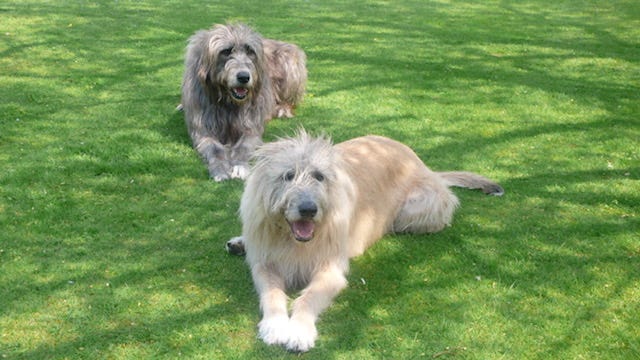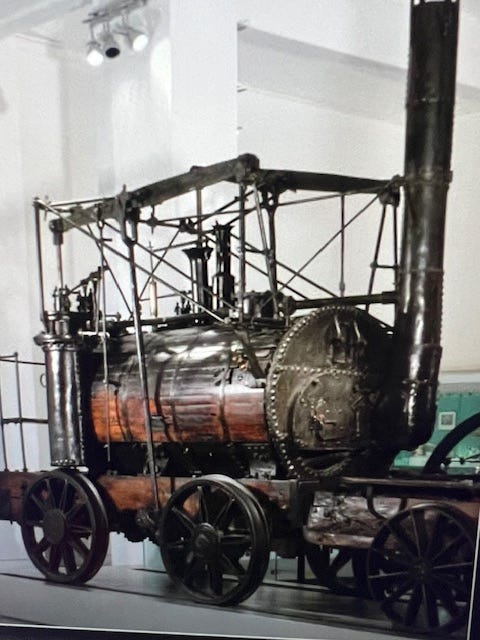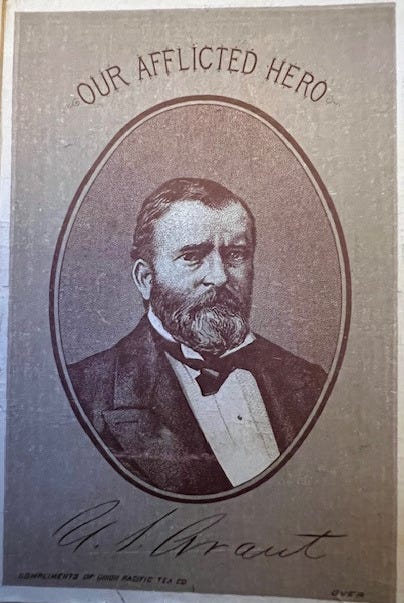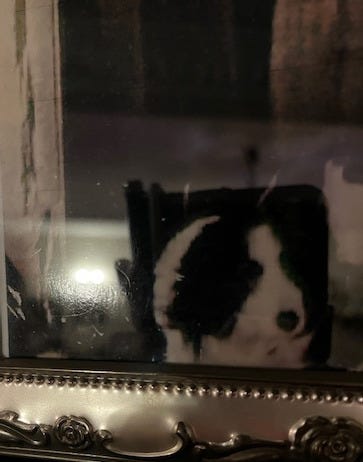DOG TALES IN IRELAND
PET LOYALTY
PADDY AND KERRY GIBB
Growing up in Ireland, everyone I knew had a family dog or working farm dog.
Sometimes good stories, sometimes not, but always a story of love and loyalty.
It was usual to see a tractor going down the road with a dog sitting up beside the farmer. The loss of a dog was a time of sadness, like losing a relative. Neighbours would miss the animal as much as the owners.
In Northern Ireland, the pet or the working dog always took on the surname of the family. Next door, we had: Lassie McNickle, a friendly sheepdog, and beside Lassie: Rover Mackay, a fifty-seven variety. On the other side we had Duck Costello, a Springer Spaniel.
One day Duck Costello ran out onto the road when a huge tanker lorry with a dozen wheels rumbled by. Duck ran at the tanker and sped through the front and back wheels and out the other side. She was so frightened she ran across the fields for miles. The Costello family and half of the neighbours searched for her but she had disappeared. It was getting dark when she eventually got home. We were all relieved she had not been hurt and dragged away under the tanker.
In the Daley’s household they had Bruce Daley. We had Teddy Murphy and Tiny Murphy, both small Lakeland Terriers. They ate the same food we did, our leftovers, and the butcher gave them a bone every week. They had stumped tails to stop foxes dragging them back if they went down a foxhole (so we were told).
I never saw tins of dog-food in anyone’s house, yet the animals lived long lives, unless they had an accident.
My sister dressed Tiny up with a baby frock and bonnet and wheeled him around in a doll’s pram . Later we had Ringo Murphy, all black with a white ring around his neck and rings on his paws. He uncannily knew the exact time my sister would get off the bus from school, and he would scoot across the road to wait for her at the bus-stop… like clockwork every school day. One day the bus ran late and, as if he knew, he waited some time before he crossed the road.
In those days there was little traffic on the main road and unbeknownst to my mother, we would go out of sight, away from home. My brother and I played tennis across the road using the white line in the middle as our net. The dog would be the ‘ball-boy’ fetching the balls that went astray.
Ringo was blamed for trying to attack Hammy Grey’s hens and we were sad when Daddy put him on a long chain tied to the clothesline for a couple of days. However, during that time, there was a further attack on Hammy’s chickens and the culprit blamed this time was Bruce Daley or so they thought, until they saw Bruce chase a fox, so both Ringo and Bruce were let off the hook.
Unfortunately the poor old fox had a tough time in Ireland. Some dreadful law came in that foxes could be trapped or shot and their tails brought to earn a half-crown (two shillings and sixpence) at the local police station.
No idea what the police did with the tails. One winter’s day I did see a local lady with a whole fox fur skin round her neck with dangling tail and toes.
It was very important to have an animal that was not going to attack farm animals, chickens, ducks, turkeys or geese, although having been chased once by a gander, I doubt any dog would dare attack a goose.
At my aunt’s house, they strutted around in groups with their kingpin gander being very watchful. I shooed him away, and next thing he flapped his wings, hissed at me, then chased me down the lane. I was scared to death with all the flapping and hissing behind me, and Auntie May nowhere in sight. I ducked through a side gate, but the blighter flew over to confront me. Luckily he did not have the gumption to fly back again over the gate when I reopened it and sped up the lane like ‘Billy-O’!
PUFFING BILLY 1813
(Apparently the phrase of ‘running like Billy-O,’ comes from the 19th century steam locomotive trials by George Stephenson, when the popular “Puffing Billy” at the collier was his inspiration to build his ‘Billy’ steam locomotive, forerunner to our trains.)
I was certainly puffed out after racing up that lane. I never chased the geese a second time and gave the hissing gander a wide berth, being ready to run if he as much as gave me the eye.
No wonder the owners of the old Irish and Scottish whiskey distilleries kept flocks of geese as ‘guard-dogs’!
Uncle Tommy and Auntie May had a Welsh Corgi called Major Prescott, Tommy’s father was American and a Prescott from Boston, I believe rivalling the Kennedys in status and in power. There was an old photo album or should I say daguerreotype album in the house with metal photographs of his ancestors, all in old USA military uniforms with one or two Mounties. An extraordinary book. There was a postcard for worming pills given with a signed picture of Ulysses Grant, Our Afflicted Hero on the front of it. And there was one photo of a very large family of Abyssinians that my aunt thought may have been servants ‘or even slaves,’ she whispered, appalled.
GENERAL ULYSSES GRANT
His parent’s portraits were very grand, and I wondered how he ended up in Ireland on a farm with iron feather beds and horsehair chairs. He was very particular about not having the ‘electricity’, seeing it as an unnatural intrusion that would affect even the little people. When we visited, it was like going back into the 1700s with oil lamps and tilly lamps. He didn’t use a tractor but had Bob the horse pull the plough, the harrow, riddle and other iron contraptions. He used a slane to cut turf in the bog, and the cows were all hand-milked in the byre. We were told there was a water-horse in the bog holes that would drag us under.
My aunt had us churn milk for her and she made yellow butter and cheese and buttermilk to make bread. Uncle Tommy used a scythe for the cutting of the hay and we rolled laps of hay in the summer and made hay ropes out of hay for the rucks or ricks so the wind would not blow them away. In September we picked potatoes and ate what I called cheese or blackcurrant jam and clay sandwiches, our fingerprints all over the sandwiches. They tasted delicious anyway with flasks of tea or homemade lemonade. Water was taken from the spring well where cress sometimes grew. I still know how to lime a well.
Eventually, my uncle agreed to have the gas light put in, and we would wait for the gas mantles once lit to turn from blue to yellow so we could read.
Major Prescott, the Corgi learned to fetch the cows down to be milked, with or without my uncle. He could duck and dive through their legs and nip their ankles if they tried to go in a different direction, and a hound called Fly Prescott would run like the wind alongside the cattle so even the cows gathered into lines to be taken to the byre, and the cat would be waiting at the byre for the cream.
Major loved to be cuddled and have his ears rubbed but he did not like his paws being touched. He would growl to let us know that if we insisted on touching his paws, he would snap. He never bit us because we knew the signs of his annoyance.
My cousin had a very posh Pekinese dog with glorious long golden fur, a squashed nose, and big brown eyes. He was called Ming Cooper and, who knows, probably a throwback to the Ming Dynasty? He was excited for people to come into the house but when they got up to leave, he had to be held or he might just go for a sharp bite on the ankles. Ming did not like to see people go. He liked to keep his audience.
There was one hero dog, that everyone loved. His name was Grouse Clingen. Grouse was known as the school dog and he would leave from his farm everyday once he heard the children in the playground. He was an oversized half collie half something else that made him big and curly with a large face and big body and soulful eyes. Every child rushed to cuddle him and play with him and he galloped around the playground and drank water from rain puddles.
He visited everyone in the village and on the farms. One little girl played with him and hugged him every day at school.
“Grouse Clingen is here!” shouted the children as they rushed to greet him.
One day, very sadly, the little girl went missing from her home. There had been a huge storm and the river was a torrent that went past most of the farms, including her parent’s place. Children often played in the river as it was usually quite shallow. In the deeper places, boys would fish for trout and skim stones. However, after storms the river was high and usually avoided.
The little girl had been playing in the garden as she usually did, but somehow she left and went to the river and must have fallen in. It could only have been minutes.
Everyone went looking for her. They put netting up at the bridge further along. Divers in wet-suits and fishermen waded through the swollen river. Police and farmers scoured the fields and the riverbanks. No-one could find her.
Then our Daddy had the idea of taking Grouse down the length of the river. On one of the bends, Grouse stood still and started barking loudly and whined, unusual for him, and it was Grouse who found her. Daddy alerted the men on the search. Unfortunately, the little one had drowned. It was the saddest day ever. The children had time off from school, and her funeral was one of the biggest ever in the district. From the back fence, my brother and I witnessed the men carrying her up from the river, with her little coat still on. My mother quickly took us inside and there was sad remembrance in our house that evening. It was especially hard for my father and he made sure that Grouse got home to his farm. We were very wary of the river after that. Grouse continued to come to the school to see the children.
Then there was old Maggie who lived at the end of the village. She has served as a character in my poems and in my Gabby Aggies. She had a dog called Betty Potter. She had a round penny moon face always smiling and hair plaited on either side. She had a few aprons on top of her clothes, the crossover style that my grandmother used to wear.
In her home, there was an old-fashioned hearth with a crook and kettle, everything blackened by soot, even her apron. When she visited my Aunt, a newspaper would be laid on the seat of the armchair before she sat down.
(My mother would put a match to the point of a needle to make soot before she took a splinter out of our fingers. She always ‘sterilised’ the needle with soot. I still do.)
I remember faded blue forget-me-nots on Maggie’s top apron. She had ducks and chickens and cats and a dog. All her animals and consecutive ones, including the replacement dog when one died, whether male or female, were called Betty. So when Maggie called out: “Betty! Dinner!” Everything came to her, cats, dog, ducks and all.
“It makes life easy,” she said.
She still saw them as separate entities. Whether they did or not might have been a different matter.
Another uncle told me he had a badger once that he rescued and reared like a puppy. It was just like a dog, following him around, and because he was feeding the badger, it didn’t bother with the hens or any other fowl. Badgers usually eat worms. However, I think this one had dog food. The tragedy was when the badger decided to go walk about and went two or three farms away, another farmer shot him thinking he was going to disturb his hens, not knowing he had become a pet.
Robin and I had two Irish wolfhounds that Robin decided should accompany us on a holiday to Ireland to see the land of their origins. They were called Paddy Gibb and Kerry Gibb, for the vet’s sake really.
We drove to Holyhead in two Range Rovers to Wales to take the Irish ferry to Dun Laoghaire, a dog in each vehicle as they were so enormous, and then made our way up North to Donegal, staying near Cruit Island Cottages. We loved the cottage with the half-door on the end by a lovely sandy bay but Stephen Rea, a favourite Irish actor, was in it that year. There is a sailor’s graveyard nearby overlooking the sea. It is a lovely peaceful place.
A lovely sheepdog used to sense when people were at that cottage with children and would travel a few miles to stay there, sleeping on the doorstep and rounding up the children if they went too far into the sea. The woman who owned the dog told us this. I had stayed there a few times and Robin loved the area. Our son named the place Red Rock and later we found out that the local Irish name meant red rocks.
We had dinner with Stephen and his boys at Danny Minnie’s a little gourmet restaurant in the middle of Donegal. My family came to stay with us in the area, mesmerized by the colourful edible pansies served with the food.
Unfortunately, the lovely house we were in had no sturdy fence and Paddy and Kerry took off, escaping over the hills, almost to the sea. We frantically took after them, asking Stephen on the way if he had seen them. Eventually we found them, with locals telling us to be careful that two bears had escaped!
“We saw them with our own eyes,” they exclaimed.
Upon our return, Robin and I and my family spent the evening hammering a fence into place to keep them in. All good fun though as Robin was a big fan of Stephen’s acting. Robin and I later went to see Stephen as a brilliant Cyrano de Bergerac at the National Theatre in London.
STEPHEN AND ROBIN
I gave Stephen some of my Irish poetry.
About a year after Robin passed, Stephen came to The Tristan Bates Theatre in London to see my comedic Irish farce: The Last Confession that ended up having to be renamed The Last Confessions of a Scallywag because a serious American play called The Last Confession was due to hit London, about a priest giving a last confession that he had murdered a Pope. I duly complied when asked to change the title, and my play went to The Mill at Sonning on Thames.
Stephen told me that:
“Farce is difficult to write but I had made it look easy. Well done!” I was thrilled.
I always admired the way Stephen, no matter how famous, brought plays to the people in the rural districts of Ireland and on the Islands.
He also told me that when he heard that Robin sadly passed away, a little robin visited him in his house that day.
There are so many stories of our visits to Ireland during the Troubles, and so many other tales of travels throughout the world.
This is mostly about my childhood in Ireland and about the dogs that were so special to owners they took on their family names.
LITTLE DOG FROM HER CHILDHOOD
The dogs are never forgotten by their families in Ireland, and maybe the families are not forgotten by the dogs either. My lovely Aunt who was my Godmother, while she was spending her last hours in hospital, smiled and told her daughter, my cousin, that her little dog from her childhood was visiting and sitting on the chair by the door.“
DWINA ***
.









Loved this so much ❤️ More, please!
Such lovely and heartwarming stories! <3